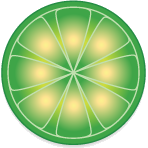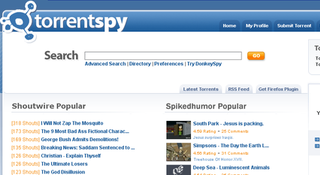
LimeWire was a free peer-to-peer file sharing client for Windows, macOS, Linux and Solaris. Created by Mark Gorton in 2000, it was most prominently a tool used for the download and distribution of pirated materials, particularly pirated music. In 2007, LimeWire was estimated to be installed on over one-third of all computers globally.
BitTorrent, also referred to as simply torrent, is a communication protocol for peer-to-peer file sharing (P2P), which enables users to distribute data and electronic files over the Internet in a decentralized manner. The protocol is developed and maintained by Rainberry, Inc., and was first released in 2001.
Topsite is a term used by the warez scene to refer to underground, highly secretive, high-speed FTP servers used by release groups and couriers for distribution, storage and archiving of warez releases. Topsites have very high-bandwidth Internet connections, commonly supporting transfer speeds of hundreds to thousands of megabits per second; enough to transfer a full Blu-ray in seconds. Topsites also have very high storage capacity; a total of many terabytes is typical. Early on these warez sites were mainly distributing software such as games and applications after the release groups removed any protections. Now they are also a source of other copyright protected works such as movies and music. It is strictly prohibited for sites to charge for access to the content, due to decreased security, and sites found doing so are shunned by the topsite community.

The Bescherming Rechten Entertainment Industrie Nederland is an advocacy group with international links, based in the Netherlands, which represents the interests of the Dutch entertainment industry and is organised under the Dutch law through the legal form of stichting. It is notable for launching court proceedings against copyright infringement in the country and for engaging in lobbying in order to create legal precedents of global significance.

The Pirate Bay is an online index of digital content of entertainment media and software. Founded in 2003 by Swedish think tank Piratbyrån, The Pirate Bay allows visitors to search, download, and contribute magnet links and torrent files, which facilitate peer-to-peer file sharing among users of the BitTorrent protocol.

TorrentSpy was a popular BitTorrent indexing website. It provided .torrent files, which enabled users to exchange data between one another.
This is a timeline of events in the history of networked file sharing.

isoHunt was an online torrent files index and repository, where visitors could browse, search, download or upload torrents of various digital content of mostly entertainment nature. The website was taken down in October 2013 as a result of a legal action from the MPAA; by the end of October 2013 however, two sites with content presumably mirrored from isohunt.com were reported in media. One of them – isohunt.to – became a de facto replacement of the original site. It is not associated in any way with the old staff or owners of the site, and is to be understood as a separate continuation.
Megaupload Ltd was a Hong Kong–based online company established in 2005 that operated from 2005 to 2012 providing online services related to file storage and viewing.
File sharing is the practice of distributing or providing access to digital media, such as computer programs, multimedia, program files, documents or electronic books/magazines. It involves various legal aspects as it is often used to exchange data that is copyrighted or licensed.

The use of the BitTorrent protocol for the unauthorized sharing of copyrighted content generated a variety of novel legal issues. While the technology and related platforms are legal in many jurisdictions, law enforcement and prosecutorial agencies are attempting to address this avenue of copyright infringement. Notably, the use of BitTorrent in connection with copyrighted material may make the issuers of the BitTorrent file, link or metadata liable as an infringing party under some copyright laws. Similarly, the use of BitTorrent to procure illegal materials could potentially create liability for end users as an accomplice.

TorrentFreak (TF) is a blog dedicated to reporting the latest news and trends on the BitTorrent protocol and file sharing, as well as on copyright infringement and digital rights.

aXXo is the Internet alias of an individual who released and standardized commercial film DVDs as free downloads on the Internet between 2005 and 2009. The files, which were usually new films, were popular among the file sharing community using peer-to-peer file sharing protocols such as BitTorrent. A download-tracking firm BigChampagne found — in a sampling period in late 2008 — that almost 33.5% of all movie downloads were aXXo torrents. aXXo encoded files to approximately 700 MB – the same size for a compact disc. Due to the re-encoded quality of an aXXo file, the suffix "aXXo" was often used by imitators.
RapidShare was an online file hosting service that opened in 2002. In 2009, it was among the Internet's 20 most visited websites and claimed to have 10 petabytes of files uploaded by users with the ability to handle up to three million users simultaneously. Following the takedown of similar service Megaupload in 2012, RapidShare changed its business model to deter the use of its services for distribution of files to large numbers of anonymous users and to focus on personal subscription-only cloud-based file storage. Its popularity fell sharply as a result and, by the end of March 2015, RapidShare ceased to operate and it is defunct. As of 2017, Rapidshare AG was acquired by Kingsley Global.

BayFiles was a file-hosting website created by two of the founders of The Pirate Bay.

This is a list on countries where at least one internet service provider (ISP) formerly or currently censors the popular file sharing website The Pirate Bay (TPB).
Rightscorp. Inc is a Los-Angeles based copyright enforcement company, which locates alleged copyright violators and collects money from legal damages as well as out of court settlements on behalf of the copyright holder(s). Rightscorp manages copyrights of videos, music, and video games.

RARBG was a website that provided torrent files and magnet links to facilitate peer-to-peer file sharing using the BitTorrent protocol. From 2014 to 2023, RARBG repeatedly appeared in TorrentFreak's yearly list of most visited torrent websites. It was ranked 4th as of January 2023. The website did not allow users to upload their own torrents.
Mp3skull was a website that provided direct download links to MP3 files located on third-party sites. It was founded in 2010 and the site has been the subject of controversy for helping users to find unauthorized copies of copyrighted music.

Z-Library is a shadow library project for file-sharing access to scholarly journal articles, academic texts and general-interest books. It began as a mirror of Library Genesis, but has since expanded dramatically.












